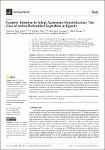| dc.contributor.author | Onek Aparo, Nathaline | |
| dc.contributor.author | Olum, Solomon | |
| dc.contributor.author | Atimango, Alice Onek | |
| dc.contributor.author | Odongo, Walter | |
| dc.contributor.author | Aloka, Bonny | |
| dc.contributor.author | Ongeng, Duncan | |
| dc.contributor.author | Gellynck, Xavier | |
| dc.contributor.author | De Steur, Hans | |
| dc.date.accessioned | 2023-03-23T09:38:53Z | |
| dc.date.available | 2023-03-23T09:38:53Z | |
| dc.date.issued | 2023 | |
| dc.identifier.citation | Aparo, N.O.; Olum, S.; Atimango, A.O.; Odongo,W.; Aloka, B.; Ongeng, D.; Gellynck, X.; De Steur, H. Farmers’ Intention to Adopt Agronomic Biofortification: The Case of Iodine Biofortified Vegetables in Uganda. Horticulturae 2023, 9, 401. | en_US |
| dc.identifier.uri | https://doi.org/10.3390/ horticulturae9030401 | |
| dc.identifier.uri | http://ir.lirauni.ac.ug/xmlui/handle/123456789/522 | |
| dc.description.abstract | Agronomic biofortification, the application of fertilizer to increase micronutrient concentrations
in staple food crops, has been increasingly promoted as a valuable approach to alleviate
micronutrient deficiencies, but its success inevitably depends on farmers’ acceptance and adoption.
By using iodine fertilizers as a case, this study aimed to understand vegetable farmers’ intentions to
adopt agronomic biofortification. Therefore, the focus is on the potential role of socio-psychological
factors, derived from two well-established theoretical models in explaining adoption intentions. Data
from a cross-sectional survey of 465 cowpea and cabbage farmers from a high-risk region of Uganda
were analyzed using binary logistic regression. The findings show that 75% of the farmers are likely
to adopt agronomic iodine biofortification and are willing to devote a substantial part of their land to
this innovation. Farmers’ intention to adopt strongly depends on their attitude and control beliefs
regarding iodine biofortification, vegetable type, access to extension services, and farmland size. This
study highlights the crucial role that behavioral and attitude factors play in communities at risk for
nutritional disorders’ potential acceptance and sustained implementation of vegetable biofortification.
To reinforce the observed positive inclination towards iodine biofortification among vegetable
farmers, it is essential to increase awareness of the benefits, potential risks, and consequences of
iodine deficiency, accompanied by motivational strategies to enhance farmers’ inherent beliefs in
their ability to implement this innovation. | en_US |
| dc.language.iso | en | en_US |
| dc.publisher | horticulturae | en_US |
| dc.subject | agronomic iodine biofortification | en_US |
| dc.subject | micronutrient malnutrition | en_US |
| dc.subject | behavioral intention | en_US |
| dc.subject | iodine-enriched vegetables | en_US |
| dc.subject | smallholders | en_US |
| dc.subject | Uganda | en_US |
| dc.title | Farmers’ Intention to Adopt Agronomic Biofortification: The Case of Iodine Biofortified Vegetables in Uganda | en_US |
| dc.type | Article | en_US |

